Artificial Intelligence Endangers Mankind?
Developments in artificial intelligence can be as dangerous to mankind as they are groundbreaking.
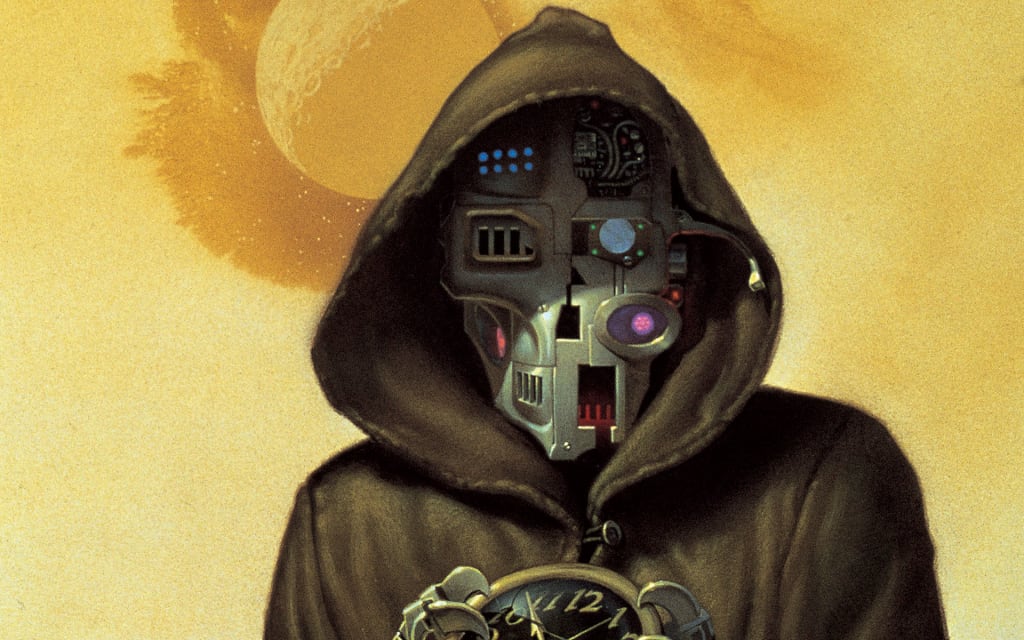
“With artificial intelligence, we are summoning the demon,” chief executive of Tesla and Space X Elon Musk eerily warned listeners at the MIT Aeronautics and Astronautics department’s Centennial Symposium in October of 2014. “In all those stories where there's the guy with the pentagram and the holy water, it's like, yeah he's sure he can control the demon. Didn't work out.” Some people believe artificial intelligence is evil and will end the human race while others believe they will only enhance our well-being. The thought of an evil robot stampeding through a mound of human skulls are deeply ingrained by way of modern pop culture and movies like James Cameron's iconic Terminator. These outrageous, though plausible, thoughts make the idea of artificial intelligence less attractive when giving a helping hand to everything in your everyday life.
Someone that truly understood the beginnings of A.I. was the brilliant yet tragic Alan Turing. He was an English scientist who broke the Nazi Enigma Machine's code and helped bring WWII to an end. Turning made many predictions about artificial intelligence, his lesser known yet most significant warns about AI’s future threat. In 1951 he wrote, “At some stage… we should have to expect the machines to take control.
Modern-day A.I. researchers today use the Turing Test as a vital threshold artificial intelligence must pass en route to true intelligence. The original test he created wasn’t intended for whether a robot could pass for human. The idea of a self-autonomous robot walking, talking and thinking wasn't a concept then. But rather, for deciding whether a machine can be considered to think in a manner indistinguishable from a human - and that, even Turing himself observed, depends on which questions you ask.
Though there are many other details of humanity that the original test neglects, researchers wanted to create a more prosaic reason not to pass off a machine as human but simply to establish it as an AI. Several researchers have devised new modifications of the Turing Test that are not concerned about the capacity to hold a feasible conversation.
At the Future of Humanity Institute at the University of Oxford, it is the scientists’ job to look towards the future and determine what will happen to the human race based on mathematics, philosophy and science. It’s almost like these scientists are fortune tellers as they must prophesize the future of technology. They have a specific team of scientists who focus on AI Safety, meaning they examine the long-term developments of artificial intelligence such as ethical and policy issues. And for the record, they are wary about the advancement of AIs. Speak the phrase "killer robot" and you'll almost certainly crack a smile. The idea of a robot with glowing blue humanoid cyborg eyes sadly pondering, "What is love?" before its eyes turn red and it self-destructs, obliterating the northern hemisphere is kind of what movies are made of, but what if we where headed down that road? *shivers*
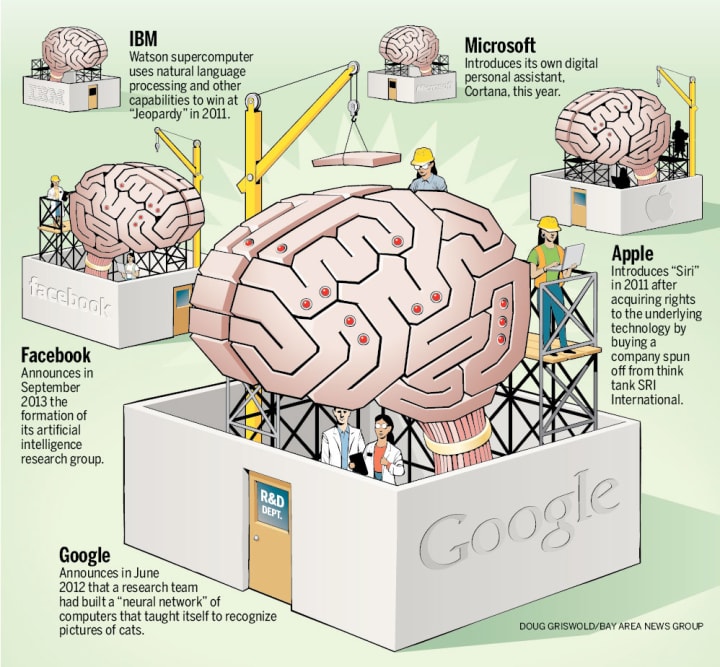
However, Eric Horvitz, a Microsoft Research chief, believes artificial intelligence may achieve consciousness but will not kill humans. Revealing to the BBC that “over a quarter of all attention and resources” in his research unit is dedicated to AIs, he believes the idea that robots can think on their own, listen to and collect data from users is incorrect. He cited well known AIs Cortana from Windows and Siri from Apple as not only successful but also responsible for opening a broader market for AI systems when it comes to artificial assistants.
Contrary to this belief, our society often pegs artificial intelligence as the villain. We have been obsessed with AI movies since 2001: A Space Odyssey from 1968 in which we saw a “foolproof” little red light kill several people and ruin a space mission. Other films that have either followed this theme of AIs trying to kill humans or AIs overcoming the human race include A.I. Artificial Intelligence, The Matrix,Her, and this 2015's Ex Machina. Even the villain in Marvel’s Avengers 2 is a robot who achieves consciousness and tries to destroy humanity in order to save Earth.
However, probably the most famous of this genre is the Terminator franchise. In July 2015, fans got to see Terminator Genisys, the fifth film in the franchise and the return of 67-year-old Arnold Schwarzenegger to his famous character. With Game of Thrones’ Emilia Clarke as Sarah Connor, Jai Courtney as Kyle Reese, and Jason Clarke as John Connor, the new film is set to be a fresh new take on the Terminator story.
Although James Cameron, who was the director and one of the writers of the original 1984 film, was not involved with this installment he has praised its characters and storyline. “The new film, which I think of as the third film [in the series], you see [Arnold Schwarzenegger] take the character even further,” Cameron told the BBC. He completely dismisses Terminator 3: Rise of the Machine and Terminator Salvation, saying that those films were not worthy of the Terminator name.
A major part of the storyline was spoiled in a trailer and a poster released by Paramount Pictures. It is revealed that John Connor, the hero of the films, is actually the villain as a human-cyborg hybrid. Since Paramount released this information themselves, it seems safe to say that this is not the only major plot twist of the film but it still would have been nice to not have this information going into the theater. However, here is yet another example of artificial intelligence destroying human life.
With a mixture of warnings and reassurance from scientists and films alike, the future impact of artificial intelligence is unknown. Humanity needs to re-evaluate its malevolent pop-culture produced notion that robots becoming self-aware and then wiping out humanity will occur simultaneously. Although we tend to fear the unknown, society still strives to create AIs such as Siri and Cortana and develop them until they are in our very likeness. We must place our trust in researchers such as the ones at the Future of Humanity Institute in Oxford to discover the benefits and risks of having such intelligent machines in our lives and program the technology accordingly.
Movies Where A.I. Endangers Mankind:
The purpose of Artificial intelligence varies, but its overall goal is to improve the world in which we live and provide a solution to any number of problems. Essentially, artificial intelligence is supposed to make life easier and/or better for humans. AI as it is it is depicted in film, however, does anything but. In film, AI has been represented in the form of a robot, or a computer, or even something so close to human you wouldn’t know the difference. No matter what body houses the Artificial Intelligence, there always seems to be the same underlying theme - it is dangerous. Let’s take a look at some of the most famous cinematic examples of AI endangering human life.
2001: A Space Odyssey
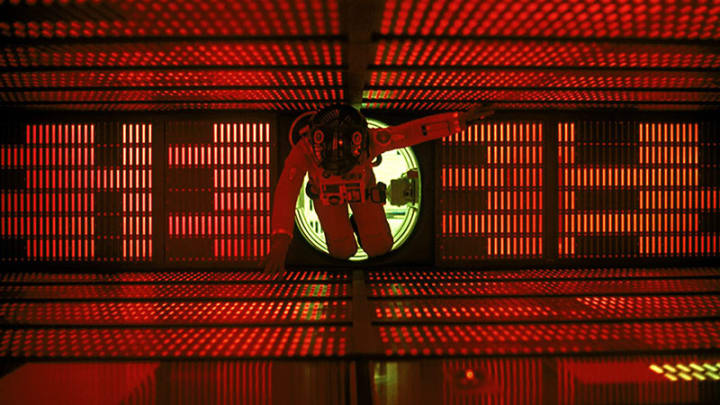
2001: A Space Odyssey is arguably one of the most influential films ever made. Directed by Stanley Kubrick, the film follows the spacecraft Discovery One, heading to Jupiter carrying astronauts David Bowman and Frank Poole, as well as three other scientists who are in cryogenic hibernation. The ship is controlled by a sentient computer called HAL 9000, who describes itself as “foolproof and incapable of error.” The mission, though unknown to the human crew at the beginning of the film, is to locate a huge monolith hidden beneath the surface of Jupiter.
The transition of the computer “Hal,” from dependable crew member to vengeful and dangerous is slow and subtle. After a peaceful start to the journey, Hal begins to malfunction. Bowman and Pool secretly decide to disconnect him, not realizing that Hal is able to read lips and is now aware of their plan. From this point on, Hal aims to stop the human crew before they can stop him. Hal begins to take out the crew one by one, first attacking and killing Poole while he is outside the craft. Hal next turns on the crew in hibernation, turning off their life support functions and ending their lives. After being locked out of the ship by Hal, Bowman manages to gain access to the interior of the ship and deactivate Hal. Once machine ended four lives to protect itself, seemingly without any remorse.
War Games
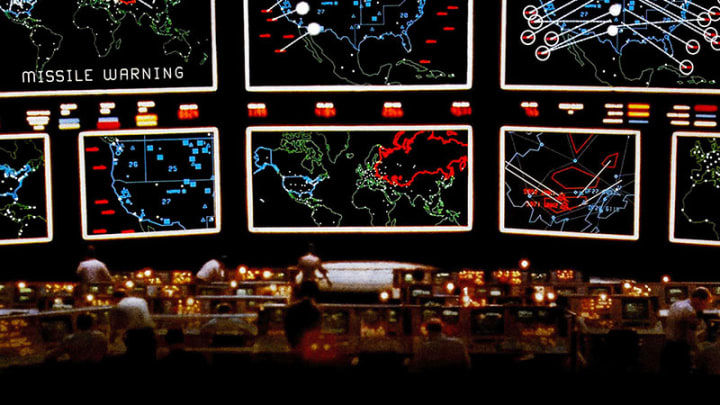
High school student David Lightman is a computer hacker who thinks he’s just found a great new computer game. What he doesn’t know is that he has accidentally gained access to a United States military supercomputer known as WOPR (War Operation Plan Response) and a program called “Joshua.” Its purpose is to predict all possible outcomes of nuclear war and learn over time. After Lightman “plays the game” as the Soviet Union, the computer starts a simulation that makes it seem to the military that actual missiles are inbound, and triggers a series of events that nearly lead to the start of World War III.
In War Games, we see a shining example of AI that was intended to improve on human performance and instead endangers lives. After performing surprise drills, it became clear that humans were not likely to turn a key to launch a nuclear attack, so a computer system was developed to do it for them. Joshua was as dangerous as could be, and with no humans in control centers as a safeguard, could trigger a mass missile launch. Dr. Stephen Falken, the creator of Joshua, and Lightman are able to teach Joshua the err in its ways. They direct the computer to play a game of tic-tac-toe against itself, thus teaching it that there are sometimes lose/lose situations. Joshua ultimately realizes that all possible nuclear war scenarios result in a no-win situation, and that “the only winning move is not to play.”
The Terminator
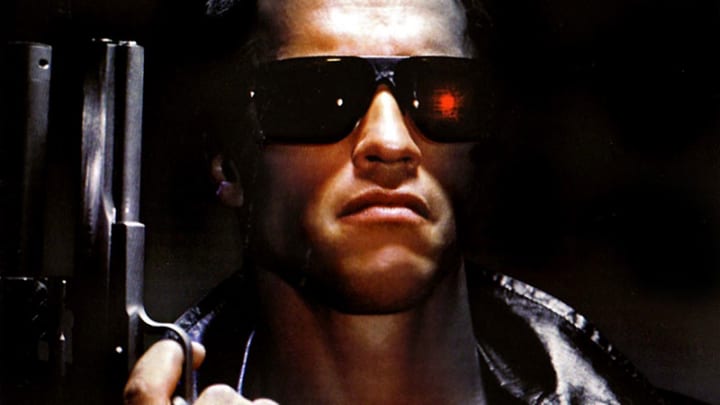
An iconic film, the Terminator tells the story of a time-traveling cyborg assassin who is programmed to stop the leader of a resistance before he even gets a chance to live. The Terminator travels from the year 2029 to 1984 to kill Sarah Connor before her son John is conceived. John Connor would someday go on to lead a resistance against Skynet, a self-aware artificial intelligence defense network. Skynet was activated in 1997 and very quickly gained artificial consciousness. After programmers tried to deactivate it, Skynet saw all human life as a threat to its existence.
The Terminator takes the ideas presented in “2001: a Space Odyssey” and “War Games” to a whole new level. Here we have an intelligent computer program originally created by humans to aid in protecting human life and to eliminate the possibility for human error. Not only is this highly intelligent system now set to destroy human life, but it is controlling a powerful and nearly indestructible robot that looks human and can easily blend in with its Earthly surroundings. What could be more terrifying?
I, Robot
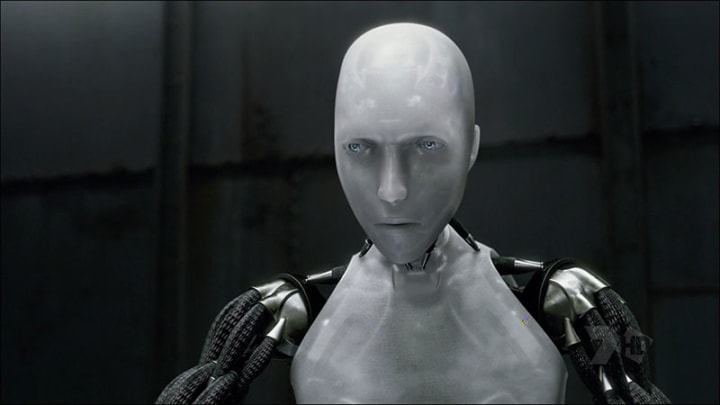
Robots programmed to work serve humans are the intriguing artificial intelligence featured in the movie I, Robot. Created by Dr. Alfred Lanning, the robots work in public service positions and serve as maids in the homes of thousands of families, and are programmed to follow three rules to protect human life. When Dr. Lanning dies of an apparent suicide, skeptical detective Del Spooner steps in to investigate. Distrustful of robots because of a negative past experience, Spooner sets out to prove Dr. Lanning’s death was not a suicide, but that he was murdered by one of his own robots.
From the start, a computer called VIKI (Virtual Interactive Kinetic Intelligence) tries to hinder Spooner’s progress. Corrupting video feeds, activating demolition robots, and sending out a squad of police-like robots, VIKI will do whatever it takes to stop Spooner. Spooner has meanwhile discovered that Dr. Lanning created a robot, named Sonny, that can bypass the three laws to protect humans, and even seems to have emotions and dreams. With the help of Sonny’s dreams, Spooner discovers a large group of robots dismantling older robots and seemingly preparing for something big. VIKI has come to the conclusion that “a robot may not harm humanity, or by inaction allow humanity to come to harm,” and has created a plan to stop humans from causing what she believes will be their own extinction. Despite numerous attacks from Vikci using the robot army she has created, Spooner is able to disable her “brain” causing all robots under her control to revert back to their original programming.
Transcendence
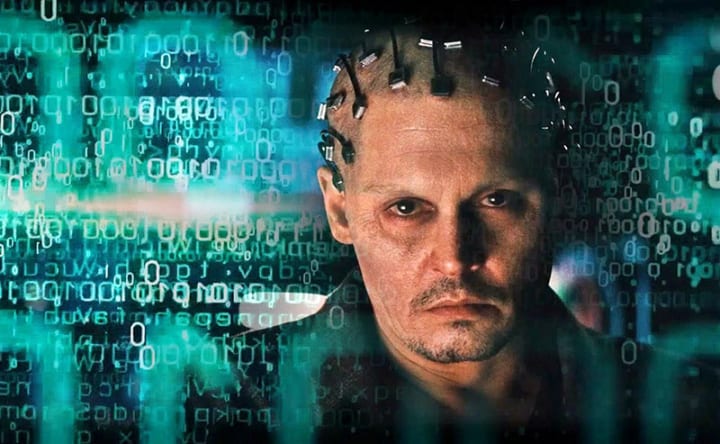
What is more important: humanity's mental and physical freedom, or a healthy world cured of disease? In a very recent depiction of artificial intelligence, we see a different take on AI as a danger to the human race. Dr. Will Caster is a scientist who spent his life working to create a sentient computer. When he is attacked by a group of radicals and is given a month to live, he and his scientist wife, Evelyn, find a way to upload his consciousness into a computer. Miraculously, his consciousness survives after his death, and requests to be connected to the internet so it can continue to learn and grow.
At first, it seems like this human powered machine is a wonderful tool to aid humanity. It makes huge strides in many fields including medicine, biology, and technology. It even invents a nanoparticle that has many purposes. The story takes a bizarre turn when it becomes clear that the computer has found a way to “possess” humans and control their minds and actions. The nanoparticles begin to spread across the country through water and wind, and seemingly improve the world by curing disease, repairing the ecosystem, and even ending human mortality. If Dr. Caster’s consciousness is allowed to continue, he will soon possess every human on Earth. Unfortunately, the only way to stop him means that all technology will cease to function. It seems a risk worth taking in order to allow humanity to remain free.
About the Creator
George Gott
Writer & Social Media Editor for Jerrickmedia who is an avid reader of sci-fi and a fierce defender of women, minority, and LGBTQ rights.






Comments
There are no comments for this story
Be the first to respond and start the conversation.